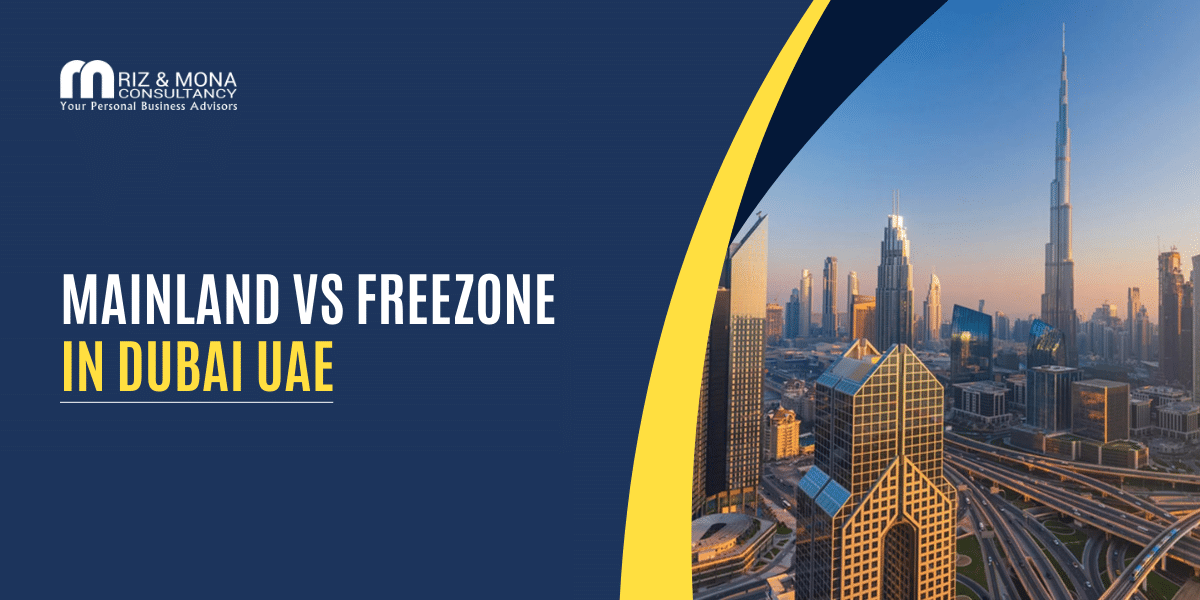Starting a business in the UAE can be a smart move, given its strategic location, favorable tax policies, and business-friendly environment. However, one of the key decisions you’ll face is whether to choose mainland or free zone for company formation.
Both options come with distinct benefits and considerations that can significantly affect your business operations, ownership structure, and access to the local market.
At Riz & Mona Business Consultancy, we guide entrepreneurs and businesses through the complexities of establishing business setups in the UAE, helping them understand the differences between mainland and freezone setups.
In this guide, we’ll provide a detailed comparison to help you make an informed decision about the best route for your business in the UAE. Whether you’re looking to engage with the local UAE market or expand internationally, understanding the differences between these two options is crucial.
Key Differences Between Mainland and Free Zone Companies
| Factor | Mainland Company | Free Zone Company |
|---|---|---|
| Ownership | Local sponsor (UAE national) usually holds 51% shares, but 100% foreign ownership is allowed in certain sectors (e.g., tech, tourism). | 100% foreign ownership allowed across all sectors, giving full control to investors. |
| Market Access | Unrestricted access to the UAE market, including government contracts and business anywhere in the country. | Restricted to operations within the free zone. For outside UAE/local market, must form a mainland branch or partnership. |
| Setup Time & Costs | Takes 5–10 days on average. Costs are higher due to office lease requirements and local sponsor fees. | Faster setup in 1–5 days. More cost-effective, as packages often include office space and visas. |
| Business Activities | Can pursue a wide range of activities without restrictions (retail, services, manufacturing, etc.). | Limited to the free zone’s focus (e.g., media, technology, logistics). Expansion outside requires a mainland entity. |
| Visa & Office | Mandatory physical office. Visa quota depends on office size and business type. | Flexible office options (shared desks to full offices). Visa quota also tied to office size and activity. |
Legal Framework and Protections; Mainland Vs Free Zone
| Aspect | Mainland Companies | Free Zone Companies |
|---|---|---|
| Legal Structure | Governed by UAE federal laws, which combine civil and Sharia law, with federal laws taking precedence. | Operate under zone-specific regulations. Some (e.g., DIFC) have independent legal systems. |
| Intellectual Property (IP) | Strong federal protection for trademarks (Federal Law No. 36 of 2021), patents, and copyrights (Federal Law No. 7 of 2002). | Varies by free zone. Some (like DIFC) provide their own IP framework, while others rely on federal IP laws. |
| Dispute Resolution | Can access UAE’s federal court system or arbitration. UAE recognizes foreign arbitration awards under the New York Convention. | Many free zones provide arbitration/mediation options. DIFC has its own courts and arbitration centre. |
Types of Business Activities for Mainland and Free Zone Companies
| Aspect | Mainland Companies | Free Zone Companies |
|---|---|---|
| Business Flexibility | Can operate across a wide range of industries without restrictions; expansion possible across all Emirates. | Activities are tailored to the specific industry focus of the free zone; each zone has its own regulations. |
| Examples of Activities | Retail, restaurants, construction, healthcare, professional services, and more. | Technology, media, logistics, manufacturing, and other sector-focused activities. |
| Government Contracts | Eligible to participate in government tenders and contracts (often essential in sectors like construction and infrastructure). | Typically not eligible for UAE government contracts unless a mainland branch or partnership is established. |
| Market Reach | Can trade freely within the UAE market and internationally. | Primarily limited to operating within the free zone; external expansion requires a mainland entity/partner. |
Long-Term Benefits of Mainland vs Free Zone Companies
| Aspect | Mainland Companies | Free Zone Companies |
|---|---|---|
| Scalability | Unrestricted access to the UAE market; easier to expand regionally and nationally. | Suited for international expansion with streamlined import/export processes. |
| Government Access | Eligible for UAE government contracts and tenders, ensuring stability and long-term opportunities. | Not eligible for UAE government contracts unless a mainland branch is created. |
| Flexibility | Can operate across all industries without zone-specific restrictions; allows diversification. | Industry focus depends on the chosen free zone (e.g., tech, media, logistics). |
| Costs | Higher long-term costs due to office lease and compliance requirements. | Lower operational costs, attractive for startups and SMEs looking for cost efficiency. |
| Ownership | In many sectors, 100% foreign ownership allowed; traditionally required local sponsor. | Always allows 100% foreign ownership, giving investors complete control. |
Cost-Benefit Analysis: Mainland vs Free Zone
| Aspect | Mainland Companies | Free Zone Companies |
|---|---|---|
| Initial Costs | Higher setup costs due to office lease, local sponsor fees, and license expenses. | Lower setup costs; many free zones provide affordable packages with office, visas, and license. |
| Ongoing Costs | Higher maintenance costs for office rent, employee visas, and regulatory compliance. | Lower operating costs with flexible office requirements and lighter regulations. |
| Profitability | Access to UAE market + government contracts → greater long-term profitability potential. | Best for international trade and industry-focused operations; profitability limited in local UAE market. |
| Growth Outlook | Strong scalability across the UAE with diversification opportunities. | Ideal for startups and SMEs seeking cost-efficiency and global market access. |
Key Takeaway: If you prioritize cost-effectiveness in the short term, free zones offer a more affordable option, while mainland companies offer higher potential for profitability and growth, despite the higher upfront costs.
In either case, ensuring that you fully understand the requirements, benefits, and limitations of each option is crucial to making the right decision for your business. It’s advisable to consult with experts who can guide you through the legal and logistical aspects of business setup in the UAE, such as the team at Riz & Mona Business Consultancy.
Business Setup Process in UAE Mainland Companies
Determine Business Activity
Decide on the business type (retail, services, manufacturing, etc.).
Reserve Trade Name
Register a unique business name that complies with regulations.
Obtain Initial Approval
Submit necessary documents to DED for approval.
Draft MOA
Create a Memorandum of Association outlining operational details.
Lease Office Space
Physical office space is required.
Apply for Business License
Finalize and submit documents to obtain a business license.
Visa Processing
Once the license is issued, apply for investor/partner visas and employee visas (number depends on office size and activity).
Open a Corporate Bank Account
Select a UAE bank, provide required documents, and open your business account.
Timeframe & Costs
-
Timeframe: Typically, the business setup process takes 5 to 10 working days. With the guidance of Riz & Mona Consultancy, the process is often smoother and can sometimes be completed on the shorter end of this range.
-
Costs: Higher costs are involved due to office lease requirements and local sponsor fees.
Start Your Business Journey with Our Professional Support!
Business Setup Process in a Free Zone
Choose the Right Free Zone
Decide on the business type (retail, services, manufacturing, etc.).
Reserve Trade Name
Register a unique business name that meets the zone’s regulations.
Submit Application
Apply to the free zone authority with the necessary documents like passports, business plan, and financial details.
Sign License Agreement
Once approved, sign an agreement defining the terms of operating within the free zone.
Establish Physical Presence
Depending on the free zone, lease office space or opt for a flexi-desk solution, which offers shared office space.
Visa Processing
Apply for investor and employee visas (the quota depends on the size of your office and business activity).
Obtain Business License
Once all steps are completed, your business license will be issued.
Open a Corporate Bank Account
With your trade license, proceed to open a corporate bank account to manage your company’s financial transactions.
Timeframe & Costs
- Timeframe: Setting up a free zone business usually takes between 1 to 5 days. The process is straightforward and designed to ensure quick approvals.
- Costs: Free zones provide affordable packages that often include office space, visas, and other essential services, making them a highly cost-effective option compared to mainland setups.
FAQS
Can I transfer a business from a free zone to the mainland?
Yes, establishing a company in the mainland requires setting up a new entity and applying for a business license, as direct transfers aren’t permitted.
WCan free zone companies open branches in the UAE mainland?
Yes, freezone companies can open branches in mainland UAE, but they must follow the regulations for business setup in Dubai or any other emirate.
Are there any restrictions on hiring non-UAE nationals in mainland companies?
Mainland companies can hire non-UAE nationals, but the number of visas depends on the office size and the nature of business activities.
How do the ongoing costs differ for mainland vs. free zone companies?
Ongoing costs for mainland companies are higher due to office leases and local sponsor fees, while freezone businesses generally have lower operational costs within their designated free zones.
Can a mainland company expand internationally?
Yes, mainland companies can freely expand internationally without restrictions, unlike businesses within designated free zones, which are limited to their zone.
What are the latest changes in UAE business ownership laws?
Recent reforms now allow 100% foreign ownership in many sectors, including business in Dubai, and across other economic zones, except in certain regulated industries.
How much is the Freezone visa in Dubai?
The cost of a Freezone visa in Dubai can range from AED 3,500 to AED 8,000 per visa, depending on the free zone and the specifics of the visa application.















